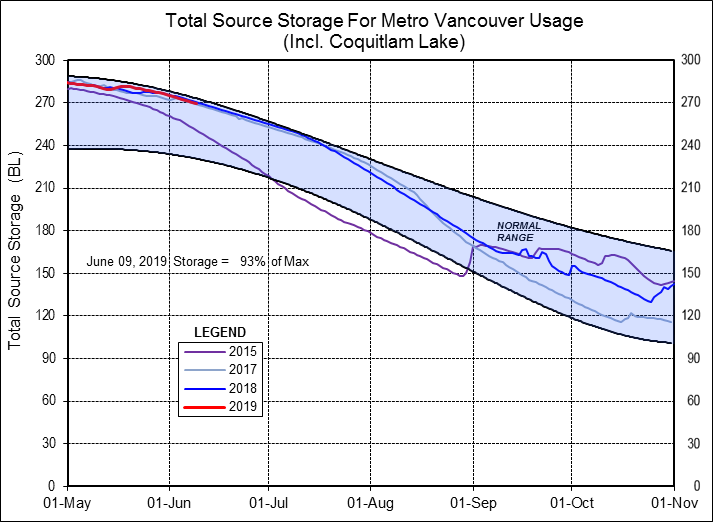LONGER, DRIER SUMMERS ARE METRO VANCOUVER’S DROUGHT MANAGEMENT REALITY: “Our unique problem is that we treat our water supply like a buffet,” stated CBC Radio’s Uytae Lee, The Early Edition’s About Here columnist (June 2019)
Note to Reader:
Uytae Lee is a Vancouver-based columnist with CBC radio, and has a background in urban design. He uses this background to rethink the city in a column with CBC’s The Early Edition. He graduated with a degree in Community Design from Dalhousie University and produced videos on city issues in Halifax for three years before moving to Vancouver in 2018. He hosts a YouTube channel, ‘About Here’ where he makes videos about urban planning issues in Vancouver.
The Metro Vancouver region has a water problem despite its place in a rainforest. Uytae Lee’s short film for CBC Vancouver explores how climate change and a growing population puts pressure on Metro Vancouver’s water supply, and how we can manage it during a drought.
Uytae Lee consulted with Kim Stephens, Executive Director of the Partnership for Water Sustainability in British Columbia, for historical context to help understand the nature of water supply and drought issues. In the late 1980s through the first half of the 1990s, Kim Stephens was an adviser to the region on watershed yields and population-support capacities for the region’s Capilano and Seymour supply sources. He was also the project manager for the region’s first comprehensive assessment of the costs versus benefits of universal metering.
Why Vancouverites need to stop treating their water supply like a ‘buffet’ – The Early Edition’s About Here columnist Uytae Lee says climate change means reservoirs won’t always be full
 “Vancouver is known for rain and snow-capped mountains, both of which supply the city’s water reservoirs. But as climate change continues to alter weather patterns and reduce rainfall, the supply will dwindle and Uytae Lee is thirsty for action to be taken now,” wrote Bridgette Watson in an article posted by CBC Vancouver.
“Vancouver is known for rain and snow-capped mountains, both of which supply the city’s water reservoirs. But as climate change continues to alter weather patterns and reduce rainfall, the supply will dwindle and Uytae Lee is thirsty for action to be taken now,” wrote Bridgette Watson in an article posted by CBC Vancouver.
“Lee told host Stephen Quinn that research from Metro Vancouver shows the snowpack on the mountains surrounding the city is predicted to shrink by 56 per cent by 2050, and the region can expect 13 per cent less rainfall in the summer by the end of the century.”
Feast and/or Famine
“Metro Vancouver’s water supply is basically a feast followed by a famine,” summarized Uytae Lee. “So every year we do our best to fill up our reservoirs by the spring and then really hope that it lasts until the fall. It’s a delicate and not always predictable system.
“But for much of our history we’ve had one saving grace – during the winter snow falls in the mountains and stays there well into the summer; and during the summer, that snow melts and provides a steady stream of water to our reservoirs so that they’re still being filled.
“We hear all the time, Vancouver is rainy, why does a place like this need water restrictions? It’s because rainy summer days are becoming rarer and the reservoirs will be emptier and it’s no longer enough to cross our fingers and hope it lasts through fall.”
To Learn More:
To read the complete article posted by CBC, download a copy of Why Vancouverites need to stop treating their water supply like a ‘buffet’.
To hear the complete interview with Stephen Quinn and Uytae Lee, click on the audio link:
http://www.cbc.ca/player/play/1531964995925/
For an understanding of the new climate reality, download Climate Projections for Metro Vancouver.

Trend Monitoring
Metro Vancouver posts weekly reservoir storage levels from May to October, when rainfall is lower and the regional demand for water is higher.
The graph below has been updated for 2019 and now uses the past 15 years of maximum and minimum water volumes to represent the normal range. Note that data from 2015 was not used to develop the range boundaries, as the extreme dry weather conditions experienced that year were not considered normal.

The Story Behind the Story
“Getting touch with Kim Stephens was probably the best decision I made when putting this video together. I am not a hydrologist by any stretch and I approached this topic with the optimistic yet under-informed curiosity of a high school student. Which is to say that I soon discovered I had very little idea of what I wanted to make a video about!
“Changing that took just one phone call with Kim Stephens. He took time to carefully explain the hydrology of Metro Vancouver, the design of our reservoir systems, lessons learned from droughts in the past, the water restrictions we have today, the troubling future of our water supply and much, much, much more.
“After our call, he directed me to key articles articles like this one and especially this one; and was generous enough to upload a video of a documentary on the topic (scroll down) – all critical insights that I used to develop the video. Above all, Mr. Stephens described the story of Metro Vancouver’s water supply in a way that was concise and thrillingly compelling. From there, the video pretty much wrote itself.
“I have so much gratitude for Mr. Stephens and all the work he does with the Partnership for Water Sustainability in BC to advocate for a more sustainable future for water in our part of the world. Thank you!”
To Learn More:
First, read the two articles referenced above by Uytae Lee:
- B.C.’s Top Story of 2015 revealed….
- FLASHBACK TO 1992: Article on “Water, Water Everywhere….Does British Columbia Really Need a Water Conservation Strategy?”
After that, and for historical context, watch this 1993 video that was produced after the Metro Vancouver region had experienced four droughts in a 6-year period. This followed a benign period of almost a half-century. Kim Stephens is featured in the documentary, and answered questions on behalf of Metro Vancouver.
Video is an Effective Educational Tool
“Uytae Lee has produced an entertaining and informative video that I believe would be invaluable as an educational tool,” commented Kim Stephens. “When Uytae contacted me, he had an idea about telling a story about water supply and drought. In an hour of conversation with me, he grasped the essentials and has weaved an exceptionally good storyline. Suffice to say, it flows! The messaging is factually correct, and that is important.”
 “Although there is a perception that BC is water-rich, the reality is that we are often seasonally water-short (mainly because of storage limitations) during the period when water demand is heaviest.
“Although there is a perception that BC is water-rich, the reality is that we are often seasonally water-short (mainly because of storage limitations) during the period when water demand is heaviest.
“In seven minutes of video, Uytae touches on all the key points that illustrate the impact of British Columbia’s new reality – warmer, wetter winters and longer, drier summers – and the consequences for sustaining a growing population in the Metro Vancouver region. If anyone wishes to understand the water and drought big picture in this region, then this is the video to watch. Well done, Uytae!.”
To Learn More:
Click on image below to watch Dan Burritt of CBC Vancouver interview Kim Stephens.

